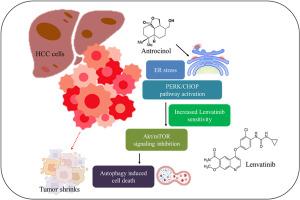antrocino介导的ATG5下调诱导lenvatinib耐药肝癌细胞自噬依赖性细胞死亡并通过PERK/CHOP信号激活未折叠蛋白反应
IF 4.7
3区 医学
Q1 PHARMACOLOGY & PHARMACY
引用次数: 0
摘要
背景:本研究旨在提供临床前证据证明Antrocinol的潜力,Antrocinol是从Antrodia cinnamomea的活性化合物中提取的antrocin衍生物,作为一种有前途的小分子候选药物,用于克服耐药肝细胞癌(HCC)。方法:建立lenvatinib耐药细胞株Huh-7和HepG2 (Huh-7/LR, HepG2/LR),观察其对Antrocinol的生存能力和凋亡反应。通过Z-VAD-FMK和shATG5转染,评估Huh-7/LR细胞的自噬依赖性细胞死亡情况。通过Western blot和qRT-PCR分析UPR通路的关键标志物。采用原位肝癌小鼠模型验证了安曲西诺的体内作用。结果:Antrocinol降低Huh-7/LR细胞活力,增加凋亡,并呈剂量依赖性激活caspase-3、-8和-9。Z-VAD-FMK抑制caspase活性,但不阻止细胞凋亡,表明存在其他细胞死亡机制。Western blot和qRT-PCR通过上调BiP/GRP78、PERK、eIF2α、ATF4和CHOP证实了UPR的激活。ATG5敲低可消除antrocinol诱导的细胞死亡,证实了自噬的作用。与Lenvatinib联合,Antrocinol协同增强自噬和细胞凋亡,抑制体外和体内肿瘤生长。结论:本研究首次证明了Antrocinol,一种新型的Antrocinol羟基化衍生物,与Lenvatinib协同作用,对Lenvatinib耐药的HCC细胞发挥抗增殖作用。我们的研究结果表明,Antrocinol可能通过激活未折叠蛋白反应(UPR)途径,特别是通过PERK/CHOP轴,并促进自噬依赖性细胞死亡,从而增强HCC的化疗敏感性。这些发现表明,自噬在HCC中起肿瘤抑制机制的作用,具有克服耐药性的潜在治疗意义。本文章由计算机程序翻译,如有差异,请以英文原文为准。

Antrocinol-mediated downregulation of ATG5 induces autophagy-dependent cell death and activates the unfolded protein response through PERK/CHOP signaling in lenvatinib-resistant hepatocellular carcinoma cells
Background
This study seeks to provide preclinical evidence demonstrating the potential of Antrocinol, a derivative of antrocin derived from the active compound of Antrodia cinnamomea, as a promising small-molecule drug candidate for overcoming drug-resistant hepatocellular carcinoma (HCC).
Methods
We developed Lenvatinib-resistant Huh-7 and HepG2 cell lines (Huh-7/LR, HepG2/LR) to evaluate their viability and apoptotic response to Antrocinol. Autophagy-dependent cell death was assessed in Huh-7/LR cells using Z-VAD-FMK and shATG5 transfection. Key UPR pathway markers were analyzed via Western blot and qRT-PCR. An orthotopic hepatocellular carcinoma mouse model was used to confirm Antrocinol's in vivo effects.
Results
Antrocinol reduced Huh-7/LR cell viability and increased apoptosis, with dose-dependent activation of caspase-3, -8, and -9. Z-VAD-FMK inhibited caspase activity but did not prevent apoptosis, indicating the presence of additional cell death mechanisms. Western blot and qRT-PCR confirmed UPR activation via upregulation of BiP/GRP78, PERK, eIF2α, ATF4, and CHOP. ATG5 knockdown abolished Antrocinol-induced cell death, confirming the role of autophagy. Combined with Lenvatinib, Antrocinol synergistically enhanced autophagy and apoptosis, inhibiting tumor growth in vitro and in vivo.
Conclusion
This study provides the first evidence that Antrocinol, a novel hydroxylated derivative of antrocin, synergises with Lenvatinib to exert anti-proliferative effects on Lenvatinib-resistant HCC cells. Our results indicate that Antrocinol may enhance chemosensitivity in HCC by activating the unfolded protein response (UPR) pathway, specifically through the PERK/CHOP axis, and promoting autophagy-dependent cell death. These findings suggest that autophagy acts as a tumor-suppressive mechanism in HCC, with potential therapeutic implications for overcoming drug resistance.
求助全文
通过发布文献求助,成功后即可免费获取论文全文。
去求助
来源期刊
CiteScore
9.00
自引率
0.00%
发文量
572
审稿时长
34 days
期刊介绍:
The European Journal of Pharmacology publishes research papers covering all aspects of experimental pharmacology with focus on the mechanism of action of structurally identified compounds affecting biological systems.
The scope includes:
Behavioural pharmacology
Neuropharmacology and analgesia
Cardiovascular pharmacology
Pulmonary, gastrointestinal and urogenital pharmacology
Endocrine pharmacology
Immunopharmacology and inflammation
Molecular and cellular pharmacology
Regenerative pharmacology
Biologicals and biotherapeutics
Translational pharmacology
Nutriceutical pharmacology.

 求助内容:
求助内容: 应助结果提醒方式:
应助结果提醒方式:


